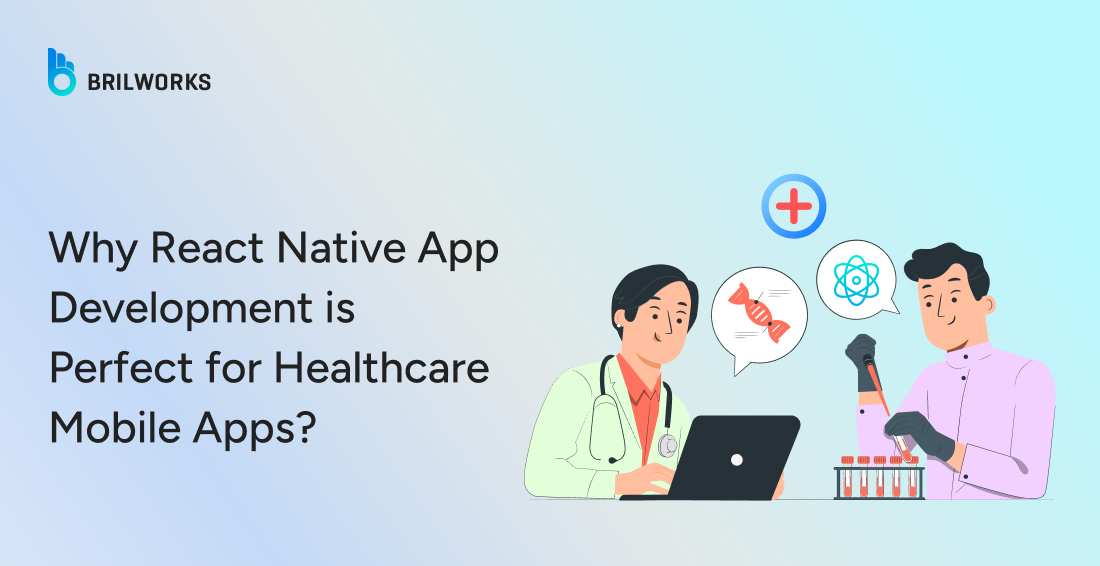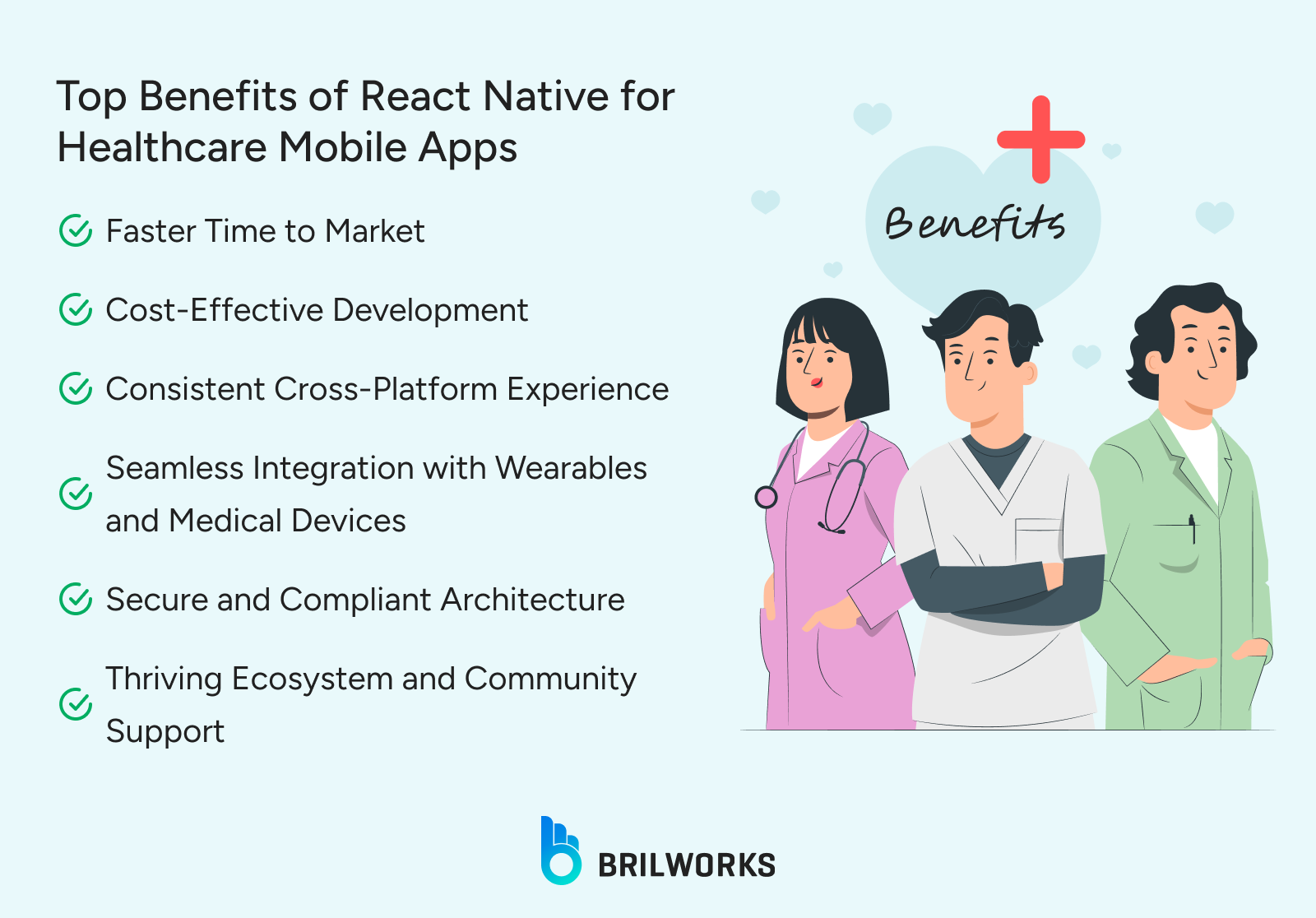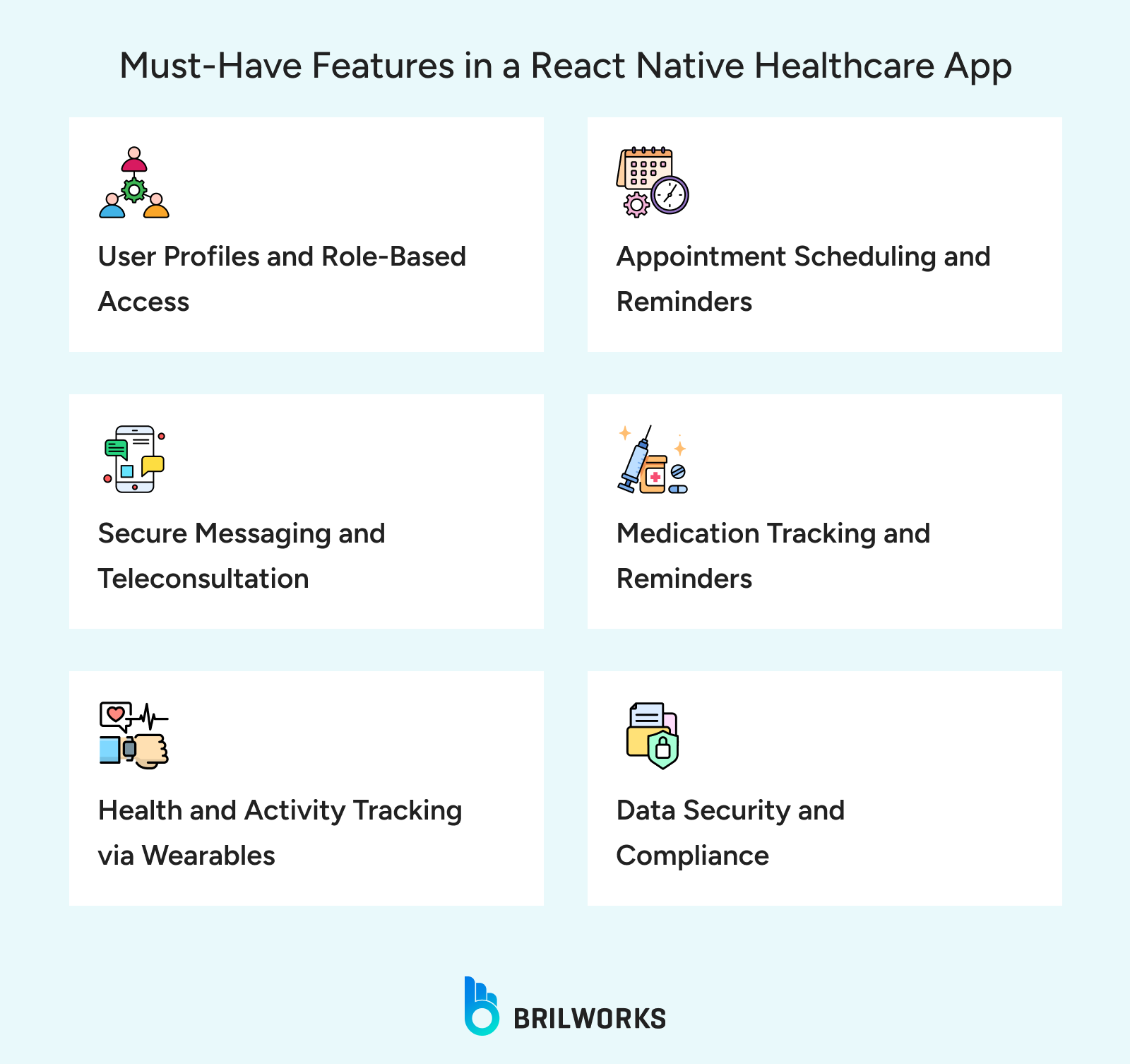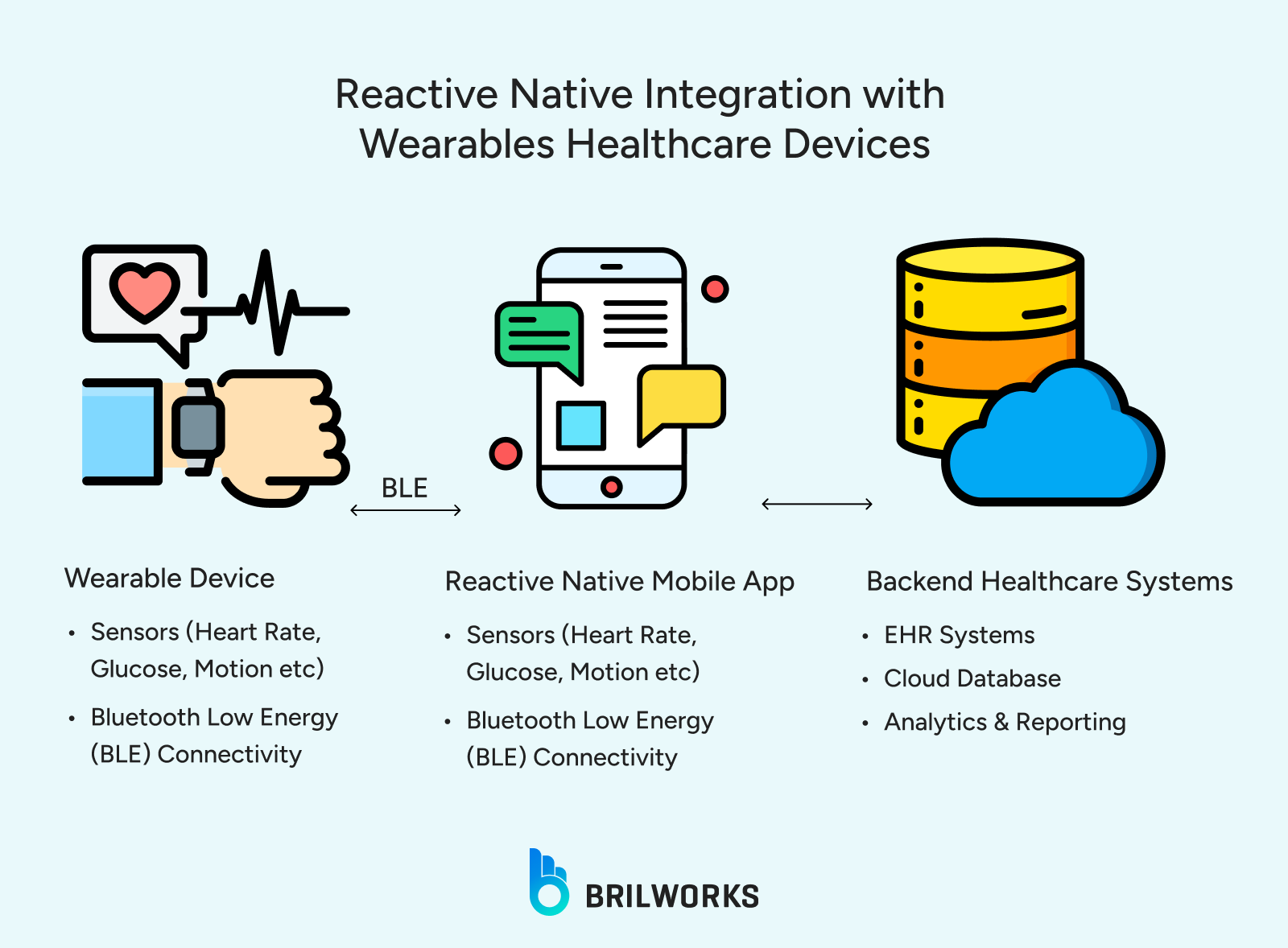COOPERATION MODEL
ARTIFICIAL INTELLIGENCE
PRODUCT ENGINEERING
DevOps & Cloud
LOW-CODE/NO-CODE DEVELOPMENT
INDUSTRY
FRONTEND DEVELOPMENT
CLOUD DEVELOPMENT
MOBILE APP DEVELOPMENT
LOW CODE/ NO CODE DEVELOPMENT
EMERGING TECHNOLOGIES








React Native is reshaping healthcare mobile app development by enabling faster delivery, seamless cross-platform support, and strong security. This blog explores why React Native stands out, the benefits it offers, must-have healthcare app features, best practices for compliance, and its growing role in wearable health technology.
Our view of medical services has been reshaped by the ongoing digital transformation in healthcare. Yet, this shift requires solutions that are secure, reliable, and ready to deploy across multiple platforms without delay.
Among the technologies leading this change, React Native app development has become a powerful choice. With one codebase, it enables teams to deliver high-performing applications that run smoothly on both iOS and Android.
The numbers also highlight this momentum. By 2032, the global mHealth market is projected to grow from $93.12 billion in 2024 to $249.05 billion, reflecting the demand for real-time healthcare access. At the same time, challenges of healthcare mobile app development remain, from navigating strict regulations to creating intuitive user experiences for doctors and patients alike.
This guide examines why React Native has become a preferred framework for developing healthcare mobile apps, the specific benefits it delivers, and how healthcare providers can use it to build secure, compliant, and feature-rich solutions.
Our react native development company helps businesses build, scale, and launch apps that work seamlessly on both Android and iOS. HIre expert React Native developers from Brilworks to build your next healthcare solution.
Healthcare apps are very different from those built for retail, travel, or entertainment. They are designed to provide essential services such as remote consultations, medical record access, and real-time monitoring. Because they handle sensitive patient data, the standards for security, reliability, and compliance are far stricter.
A healthcare mobile app must be:
Secure enough to safeguard patient records
Reliable with minimal downtime
Responsive for real-time interactions
Compliant with HIPAA or GDPR regulations
Accessible on multiple platforms
This is where React Native fits perfectly. Built by Facebook, it allows developers to create cross-platform apps from a single codebase, saving both time and cost. Its scalability also makes it ideal for enterprise-level solutions that adapt to evolving healthcare needs.

When you are building a healthcare app, you are creating more than software, you are building a service that directly impacts patient outcomes. Choosing the right framework is critical. Here’s why React Native brings a host of advantages for this sector.
In healthcare, speed matters. Whether it’s a telemedicine tool or a patient monitoring app, delays in launch can affect care delivery. With React Native’s single codebase approach, you can build for both iOS and Android at once, which allows you to:
Launch MVPs faster for real-world feedback
Adapt quickly to regulatory changes or urgent healthcare needs
Push updates like EMR integrations without rebuilding separately
Building separate native apps often doubles the cost. With React Native, a single team can manage development and testing for both platforms. This lowers upfront expenses, simplifies quality checks, and reduces long-term maintenance costs.
Consistency across platforms is crucial. Doctors may use tablets while patients rely on Android or iOS phones. React Native ensures a uniform interface and smooth functionality, minimizing errors in critical tasks like prescription tracking or appointment booking.
Healthcare is increasingly moving toward connected care. Apps often need to integrate with:
Smartwatches for vitals
Blood pressure monitors and glucometers
Bluetooth thermometers and pulse oximeters
With React Native’s support for Bluetooth integrations and third-party libraries, developers can build real-time, device-connected apps for cardiology, diabetes management, and remote monitoring.
Security is non-negotiable in healthcare. React Native supports robust practices such as biometric authentication, encrypted data storage, and HIPAA/GDPR compliance features. Combined with a carefully designed architecture, this ensures apps meet regulatory demands without compromising usability.
Healthcare apps often require niche integrations, from secure messaging to EMR access. React Native’s strong community provides solutions, open-source libraries, and long-term support, helping developers address these challenges efficiently.

Having the right tech stack is just the start. A healthcare app’s success depends on how well it serves patients, doctors, and administrators. Some of the most essential healthcare app features include:
Role-based user profiles for patients, doctors, and admins
Appointment scheduling with reminders and calendar sync
Secure messaging and teleconsultation
Medication tracking and notifications
Wearable and activity tracking integrations
Strong data security and compliance features
In healthcare, cutting corners is not an option. Here are the best practices for developing your app:
Prioritize HIPAA and GDPR compliance with robust encryption
Use React Native’s component-based architecture for scalability
Leverage hot reloading and CI/CD pipelines for faster iteration
Ensure seamless integration with healthcare systems (EHR, labs)
Follow Agile methodology for app development for adaptability
Design with accessibility and inclusive UX in mind
Monitor evolving regulatory standards to keep apps compliant

The wearable market, valued at $157.30 billion in 2024, is expected to reach $1.6 trillion by 2032. React Native is playing a growing role in building companion apps that sync with devices, enabling:
Real-time vitals tracking through Bluetooth
Unified dashboards for patients and providers
Background syncing and anomaly alerts
Fast prototyping for innovative use cases
From sleep monitoring to post-surgery rehabilitation, React Native enables patient engagement apps that go beyond monitoring to deliver real-time, actionable care.
One area where React Native shines is in powering Healthcare mobile app solutions that drive patient engagement. Features like appointment scheduling, medication reminders, and secure teleconsultations help patients stay connected to providers and manage care effectively.
With React Native, these engagement tools can be built faster and rolled out on both platforms simultaneously.
If you are exploring React Native healthcare app development, here’s when it’s the right fit:
You want to build for both Android and iOS quickly
You are developing an MVP to test a new idea
Your app includes features like scheduling, messaging, or telehealth
You plan to integrate with wearables or fitness trackers
You want to deploy updates rapidly and maintain one codebase long term
If even two of these apply, React Native is likely the right choice for your healthcare project.
At Brilworks, we specialize in React Native app development for healthcare. From HIPAA-compliant architecture to seamless device integration, we create apps that are fast, secure, and scalable.
Build secure apps with compliance at the core
Accelerate delivery with one codebase
Enhance patient engagement with user-friendly features
Integrate AI/ML for smarter health insights
Stay agile with long-term support and continuous updates
Are you ready to launch your next healthcare innovation? Contact us to get started.
With a strong emphasis on React Native app development and extensive practical experience in mobile app development, we create healthcare solutions that are user-centric, high-performing, and HIPAA-compliant.
We'll assist you whether you're introducing a new healthcare platform, integrating wearable technology, or improving patient engagement.
Build secure apps with robust encryption and compliance at the core
Accelerate development using a single codebase for iOS and Android
Deliver exceptional user experiences for patients, doctors, and admins alike
Integrate AI/ML features like predictive analytics or symptom checkers
Stay agile with continuous updates and long-term maintenance
Are you prepared to create a cutting-edge mobile healthcare app?
Together, we can make your idea a reality in a safe, effective, and large-scale manner.
Contact us to get started.
React Native enables cross-platform development, allowing you to build apps for both iOS and Android from a single codebase. It also supports HIPAA-compliant features, integration with wearables, and fast deployment.
Key features include role-based user profiles, appointment scheduling with reminders, secure messaging and teleconsultation, medication tracking, wearable integration, and strong data security. These features ensure your app is functional, reliable, and compliant.
React Native is flexible enough to support a wide range of healthcare applications. Whether you're building a patient engagement app, a telemedicine solution, a wellness tracker, or a remote monitoring tool, React Native offers the tools and ecosystem to develop responsive and scalable apps that work seamlessly across both iOS and Android devices.
React Native can connect mobile apps with wearable devices through Bluetooth Low Energy (BLE) integrations. This allows real-time health data sync, alerts for anomalies, and unified dashboards for patients and providers, supporting personalized care and continuous monitoring.
React Native provides libraries and best practices for encryption, secure authentication, and safe data handling. Pairing this with HIPAA-compliant app development guidelines, continuous audits, and secure backend integrations ensures regulatory compliance.
Get In Touch
Contact us for your software development requirements
Get In Touch
Contact us for your software development requirements